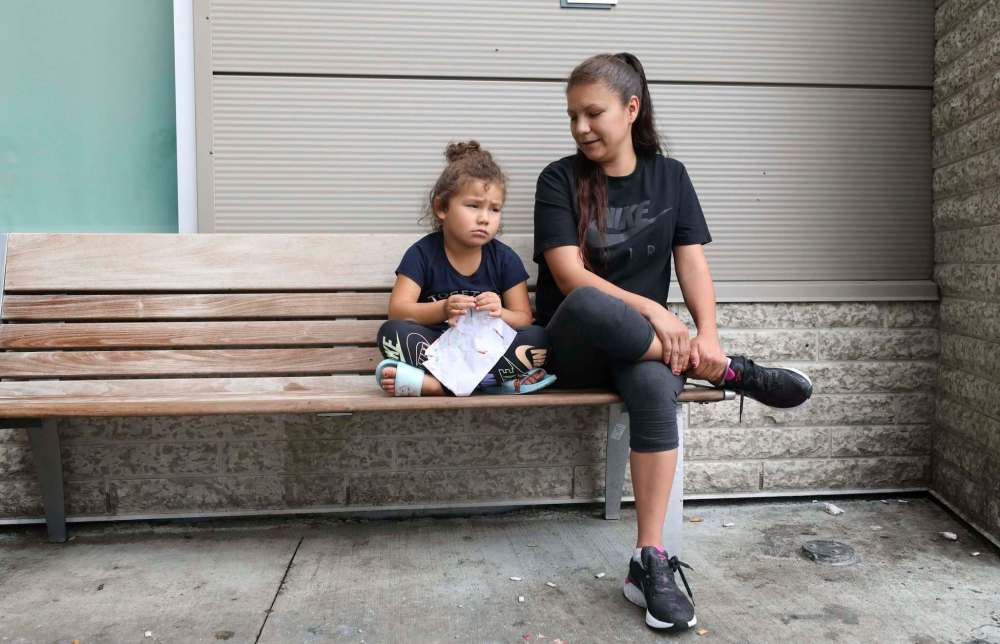Fire evacuees in Winnipeg just want to go home
Downed hydro lines the holdup
Advertisement
Read this article for free:
or
Already have an account? Log in here »
To continue reading, please subscribe:
Monthly Digital Subscription
$1 per week for 24 weeks*
- Enjoy unlimited reading on winnipegfreepress.com
- Read the E-Edition, our digital replica newspaper
- Access News Break, our award-winning app
- Play interactive puzzles
*Billed as $4 plus GST every four weeks. Offer only available to new and qualified returning subscribers. Cancel any time.
Read unlimited articles for free today:
or
Already have an account? Log in here »
Hey there, time traveller!
This article was published 19/08/2021 (1293 days ago), so information in it may no longer be current.
Tired of living in the concrete jungle of Winnipeg for more than a month, Amanda Martin is eager to get back home to the pristine wilderness of Little Grand Rapids.
She is one of roughly 1,500 residents from Little Grand Rapids First Nation and Pauingassi First Nation who have been forced to stay in Winnipeg hotels while crews battle wildfires and Manitoba Hydro fixes downed poles.
“I didn’t want to come,” Martin, 33, said about being in Winnipeg.

In July, she learned that she and her family had a day to pack and leave. Now, Martin and three of her children stay in the Residence Inn by Marriott. Her kids use the pool and hotel activity room. It’s not bad, she said — but, she wants to get home soon.
“I just hope I’m home before Christmas,” said Clifton Keeper, another member of Little Grand Rapids who is staying at the hotel.
Evacuees have heard different messages: chiefs have said everyone will head back north this fall, but there have been rumblings the move might be delayed until March because of the difficult of fixing the power lines.
There is no power in either First Nation. Wildfires have scorched approximately 800,000 hectares of land east of Lake Winnipeg, a provincial spokesperson said.
About 100 poles that carry power to the two communities are out of service and. Fixing them is a “top priority,” Manitoba Hydro said Thursday.
“There is no timeline as of yet,” said Jason Small, a spokesman for the Canadian Red Cross, about when evacuees will return home. “We are here to provide support for the communities until they determine that it’s time to go home, and then we will provide the support to help them get back.”
Manitoba Hydro estimates it will take six to eight weeks to fully restore service to the communities.
The utility accessed the area by helicopter last week. It hired a line construction contractor to help restore power, and now, crews and materials are streaming in.
It expects to begin line repair and pole replacement work as of Aug. 23. Weather, newfound damage as crews hit the ground and dealing with poles set in rock outcrops are potential concerns, Manitoba Hydro said in its release.
In Winnipeg, evacuees believe it’s the lack of power, not wildfires, that is responsible for the delay in getting home.
“We’re just waiting patiently,” Keeper said. “It’s pretty quiet. We’re looking out for each other here.”
As of Wednesday, there were 124 active wildfires in Manitoba. Other First Nations to be evacuated this summer, including Bloodvein First Nation, have returned to their communities.
On Thursday, the province announced it would lift fire and travel restrictions in most areas, effective Friday at 8 a.m. Restrictions will remain in place in Area 4, which includes Little Grand Rapids and Pauingassi. It encompasses the area from Lake Winnipeg to the Ontario border, and Poplar River in the north to Wanipigow River in the south.
The Red Cross has been helping wildfire evacuees since early July, including health supports, co-ordinating flights, setting up hotels and meals, and offering hygiene kits and recreational activities.
Chad Duck, 24, has been taking martial arts lessons and swimming during his time in Winnipeg.
The Little Grand Rapids First Nation member wants to return home, but only when it’s safe. He said he hears complaints from older community members.
“It’s hard for them to adjust to city life,” Duck said. “They’re used to fishing and hunting.”
Duck said it will be best to head north when the smoke and fires have cleared.
gabrielle.piche@freepress.mb.ca

Gabrielle Piché
Reporter
Gabby is a big fan of people, writing and learning. She graduated from Red River College’s Creative Communications program in the spring of 2020.
Our newsroom depends on a growing audience of readers to power our journalism. If you are not a paid reader, please consider becoming a subscriber.
Our newsroom depends on its audience of readers to power our journalism. Thank you for your support.


